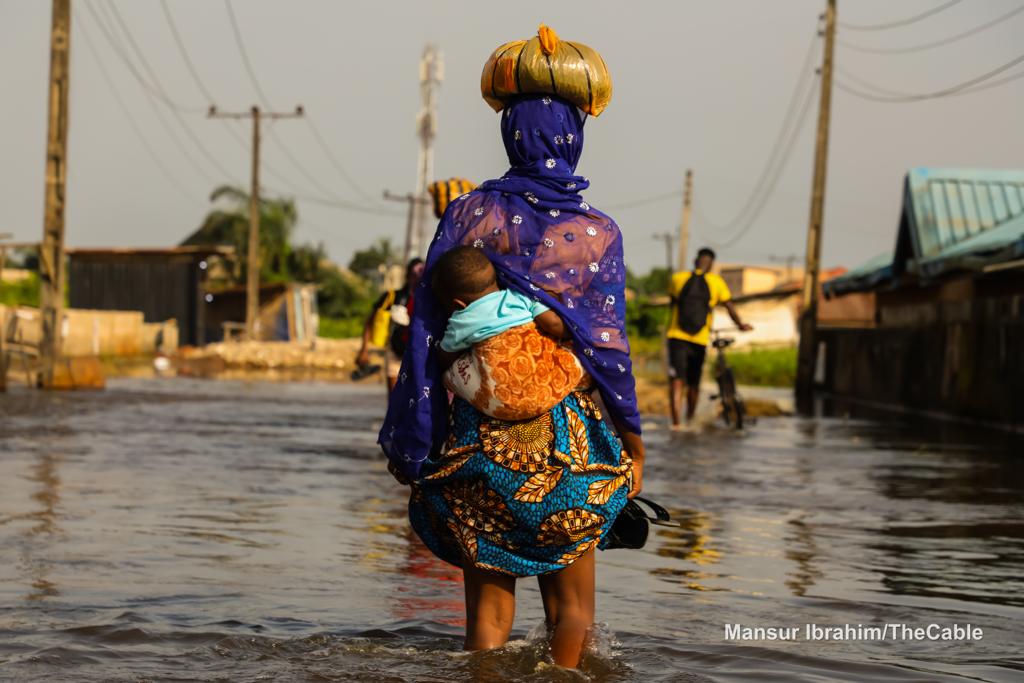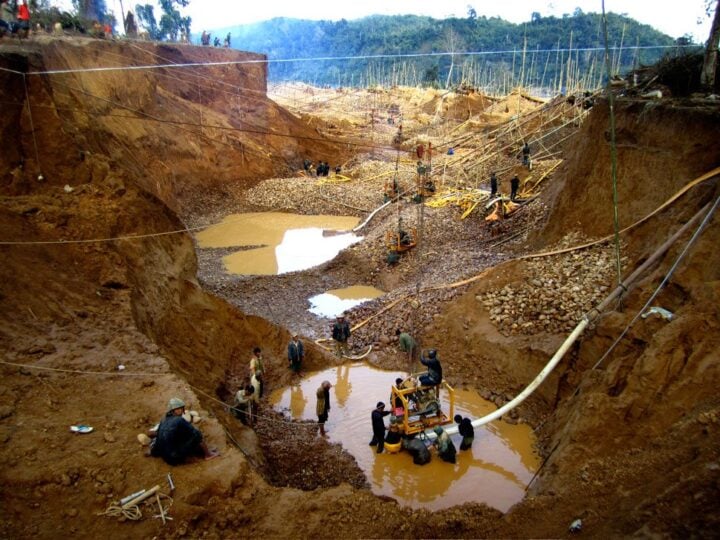A nursing mother with her baby walking through a flooded street in Warewa community in Ogun state
BY AWO JAIRUS
Nigeria, Africa’s most populous country, stands at a pivotal crossroads in its battle against climate change.
The urgency of the situation is evident, with Nigeria’s coastal areas facing increased threats due to their low-lying nature, and extreme weather events disrupting the lives of millions.
It’s clear that Nigeria’s current efforts, as outlined in its nationally determined contributions (NDCs), fall short of the ambition needed to combat climate change effectively. As the country prepares for COP28, the need for a more resolute and actionable climate change plan cannot be overstated.
Advertisement
The conference of parties (COPs) is the supreme governing body of an international convention on climate change organised by the United Nations Framework Convention on Climate Change (UNFCCC).
Climate change is a global priority, and for almost three decades, member countries have gathered to discuss sustainable ways of keeping the earth’s temperature at 1.5 degrees Celsius, according to the Paris Agreement.
The 28th conference of parties (COP28) will gather world leaders from nations in Dubai, United Arab Emirates, from November 30th to December 12th, 2023. One of the key themes of COP28 is climate finance, intertwined with just transition as well as climate change adaptation.
Advertisement
In this conference, Nigeria will make a strong case for climate finance that will facilitate a just transition. However, for context, it’s important to analyse some key issues about climate change in Nigeria.
Climate Change in Nigeria
Nigeria’s climate is changing, and the effects are tangible. Droughts, floods, and heatwaves are becoming more frequent, wreaking havoc on infrastructure, agriculture, and displacing communities. The heart of the matter lies in the country’s vulnerability due to its geographical location and diverse ecosystems.
The percentage rise in the impact of climate change in Nigeria is difficult to quantify precisely, as there is no single metric that can fully capture the complex and interconnected nature of the problem. However, we can get a general sense of the magnitude of the increase by looking at trends in key climate indicators, such as temperature, precipitation, and sea level rise.
Advertisement
The World Bank’s Climate Risk Country Profile for Nigeria reports that the country’s mean temperature has increased by about 1°C since the pre-industrial era. This is slightly higher than the global average warming of 0.85°C over the same period. The report also highlights variable rainfall patterns causing more frequent and severe droughts and floods while maintaining that the country’s sea level rise of 3mm per year is slightly higher than the average rate of sea level rise.
NDCs fall short of the Paris Agreement
Nigeria’s current unconditional nationally determined contributions (NDCs) aim to reduce greenhouse gas emissions by 20 percent by 2030. While this is a positive step, it is not ambitious enough to meet the long-term goals set by the Paris Agreement.
Nigeria’s 2030 conditional target is rated as “almost sufficient” by experts. This rating suggests that while Nigeria’s target is not currently aligned with limiting global warming to 1.5°C, “if all countries were to adopt a similar approach to Nigeria, it would only be possible to keep global warming below, but not significantly below, 2°C”.
Advertisement
Worse still, the country faces challenges in achieving even these modest targets due to ongoing trends and a reliance on fossil fuels.
What Nigeria must do
Advertisement
Nigeria must raise its ambition by aligning its NDCs with the Paris Agreement’s 1.5°C goal, setting more ambitious targets for greenhouse gas reduction. This step will reflect the country’s commitment to a sustainable future.
Nigeria is blessed with abundant renewable energy resources, including solar and wind power. The country has a vast potential for renewable energy, with an estimated 25.2 GW of solar potential, 11.5 GW of wind potential, 12.2 GW of hydropower potential, 10.5 GW of biomass potential, and 2.9 GW of geothermal potential.
Advertisement
Despite this potential, renewable energy currently accounts for just 2.3% of Nigeria’s total electricity generation in 2022.
Nigeria’s forests and mangroves are critical in absorbing carbon dioxide from the atmosphere. Nigeria is reportedly among the countries with the highest rate of deforestation in the world, with an estimated 3.7% loss of its forests annually. Actions like enforcing environmental laws, promoting sustainable agriculture, and restoring degraded forests and mangroves could set Nigeria on a better path.
Advertisement
Nigeria’s infrastructure is vulnerable to extreme weather events. Investment in resilient infrastructure, such as roads and buildings, is necessary to minimise damage and aid in swift recovery.
Nigeria’s climate change challenges are substantial, but so are the opportunities to lead the way towards a sustainable and prosperous future in Africa.
By elevating the ambition of its NDCs, investing in renewable energy, protecting critical ecosystems, supporting resilient agriculture, and building climate-resilient infrastructure, Nigeria can forge a path to a better tomorrow.
It is not just a climate issue; it is about securing the well-being and prosperity of its over 230 million people. The world will be watching as Nigeria takes the stage at COP28, hoping to see it lead by example and inspire others to follow suit in the fight against climate change.
Awo Jairus, a climate change reporter, can be contacted via [email protected]
Views expressed by contributors are strictly personal and not of TheCable.
Add a comment






